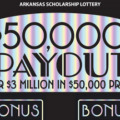
The Arkansas Lottery is rolling out new scratch-off tickets this month — including one that sells for $20 per ticket.
As we have written many times, instant ticket sales make up most of the Arkansas Lottery’s income.
However, scratch-off tickets are controversial, because they are thought to be more likely to contribute to problem gambling and gambling addiction.
A 2015 study in Canada found a link between problem gambling and instant lottery tickets, writing,
It is possible that problem gamblers are more attracted to instant win tickets than lottery tickets because instant win tickets provide immediate feedback. Some authors have even described instant win tickets as “paper slot machines” (Griffiths, 2002). Therefore, instant win tickets might be considered a more exciting form of lottery gambling, which may help explain why it attracts a different type of gambler than [ordinary] lottery tickets do.
Scratch-off tickets that sell for $20 each are especially problematic, because they entice players to spend — and lose — larger amounts of money each time they play one of these lottery tickets.
For years, the Arkansas Lottery has followed a pattern of regularly rolling out new scratch-off tickets and budgeting upwards of 69% or 70% of its revenue for prizes in an ongoing effort to prop up lottery ticket sales.
In fiscal year 2023, the Arkansas Lottery took in an astounding $608 million. It spent approximately 19% of that revenue on college scholarships and 69% of its revenue on prizes.
For perspective, the typical state lottery spends about 60% of its revenue on prizes and 30% on education.
The Arkansas Lottery’s over-reliance on big prizes, long odds, and expensive scratch-off tickets makes it an especially predatory form of gambling.
Family Council has supported legislation in the past that would restructure the Arkansas Lottery’s budget to increase spending on education. The state-run lottery could provides millions of dollars more in scholarship funding if it simply would reduce its prize budget and increase its scholarship budget to align with other state lotteries.
Unfortunately, there simply doesn’t seem to be much impetus to do that.
Articles appearing on this website are written with the aid of Family Council’s researchers and writers.




